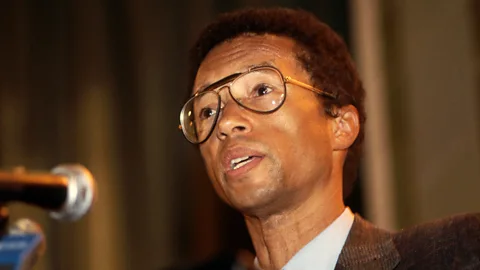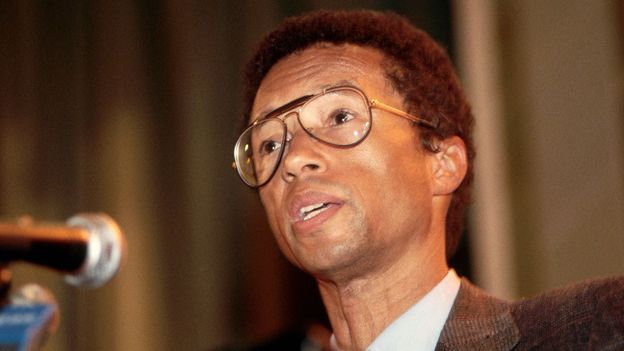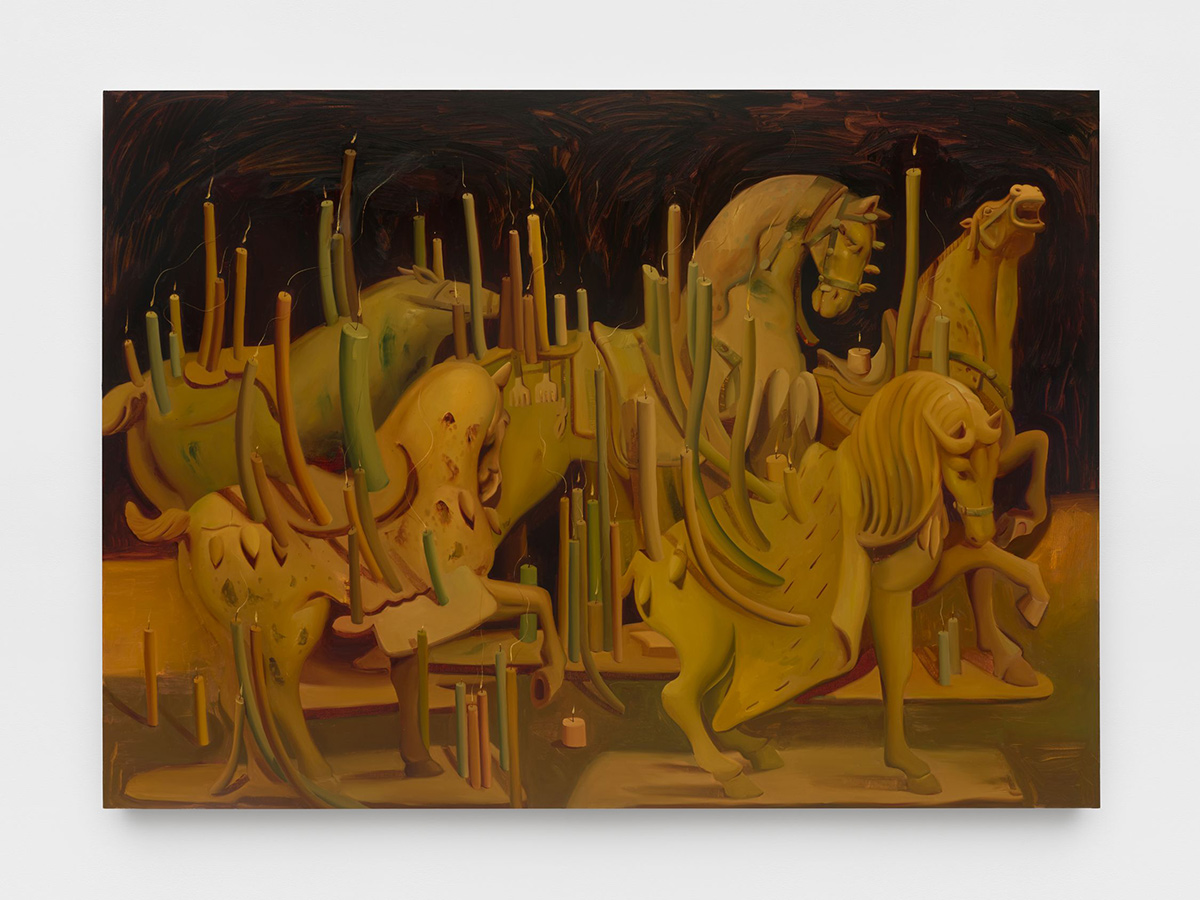 Getty Photos
Getty PhotosIn 1988, World Aids Day started with the purpose of elevating consciousness and understanding of a illness that had struck concern in communities across the globe. That very same yr, US tennis legend Arthur Ashe realized of his personal analysis. In Historical past appears to be like on the dilemma that confronted Ashe, when, after years of secrecy, he as soon as once more turned a groundbreaking campaigner.
In April 1992, Arthur Ashe made his approach right into a packed convention room, the place the media have been poised with cameras rolling. This time he wasn’t being requested about his function as the primary black tennis participant to be chosen for the US Davis Cup crew, or about his pioneering victories at Wimbledon, the US Open or the Australian Open. He had cemented his identify in historical past as the primary black winner of a serious males’s singles championship, however after a coronary heart assault that led to a number of surgical procedures, he had retired from the game 12 years earlier, on the age of 36.
His intelligence, composure and sportsmanship had made him a preferred determine, on and off the courtroom. However the press had heard rumours about his well being, at a time when the world was nonetheless stuffed with concern of an incurable epidemic. USA Right this moment sports activities journalist Doug Smith, a childhood buddy, confronted Ashe a couple of tip-off he had acquired. The subsequent day, eager to regulate his personal story and beat the press, Ashe reluctantly instructed the world the key that he and his internal circle had stored since 1988: he had Aids.
He believed that he had contracted the sickness from a contaminated blood transfusion throughout surgical procedure in 1983, two years earlier than blood donations have been screened for the HIV virus within the US. The devasting information shocked the nation, nevertheless it shortly led to a debate round private privateness and the ethics of an invasive press. On the convention, Ashe learn a press release: “I’m indignant that I used to be put… within the unenviable place of getting to lie if I needed to guard my privateness.” He added that “there was actually no compelling medical or bodily necessity to go public with my medical situation”. In his memoir, Days of Grace, Ashe wrote: “Greater than 700 letters reached USA Right this moment on the difficulty of my proper to privateness, and about 95% vehemently opposed the newspaper’s place.”
Some Aids activists criticised Ashe’s need for secrecy round his well being, as they needed public figures to broaden dialogue past the main focus of the LGBT+ neighborhood. Some felt that he would have been the right spokesperson to lift consciousness, significantly amongst heterosexuals and minority teams: one letter went so far as to say that Magic Johnson, the NBA participant who revealed his HIV analysis simply 5 months earlier, might have been saved had Ashe spoken up sooner.
When requested on the information convention why he did not go public in 1988, Ashe stated: “The reply is straightforward. Any admission of HIV an infection at the moment would have severely, completely, and – my spouse and I believed – unnecessarily infringed upon our household’s proper to privateness.” When the topic turned to telling his five-year-old daughter Digital camera about having the illness, emotion overcame Ashe, and his spouse Jeanne learn on his behalf.
The parameters of privateness
USA Right this moment sports activities editor Gene Policinski had no qualms about his choice to pursue the story. He instructed the BBC’s Tom Brook: “This is likely one of the nice athletes of the twentieth Century. His identify is immediately recognisable in regards to the world. He has an sickness that may show deadly and, by any definition I’ve run into in 25 years within the newspaper enterprise, that’s information.” When requested if he felt any guilt, he stated: “No, I did not. That will by some means indicate that I felt my choice was fallacious. And I do not.”
Three months after revealing to the world that he had Aids, Ashe was in London to commentate on Wimbledon for HBO. Throughout his journey, he was interviewed by the actor Lynn Redgrave on the BBC programme Combating Again. He stated: “I undoubtedly needed to go public at some stage, once I was fairly wholesome, to offer myself time to assist the trigger worldwide. However my well being was so good, I needed to proceed to do what I used to be doing with out being bothered by this… Simply the prospect of going public, you may have some fears and a few inconveniences you recognize you may should endure.”
Finally, the difficulty of privateness loomed massive, and as he had accomplished many instances earlier than, Ashe requested questions of the established order. On the Nationwide Press Membership, he challenged journalists to look at their sensibilities, asking, “What are the parameters of non-public privateness? What are they? Who units them? And by whose authority are they issued? To me, or to some other American, what’s sacrosanct and inviolable?”
This was removed from the primary public stance Ashe took on a wider social subject. Whereas his sporting prowess helped him break boundaries on the courtroom for black athletes, he spent a lot of his break day the courtroom campaigning for change. Born in Richmond, Virginia in 1943, he had retreated into the world of sports activities and books after his mom died when he was simply six years outdated. “Management is essential to me,” he instructed Redgrave. “You develop up black within the American south within the late Forties and the Nineteen Fifties, you don’t have any management. White segregationist legal guidelines let you know the place to go to highschool, which bus you’ll be able to experience on, the place you’ll be able to experience on the bus, which taxis to take, what you’ll be able to say. Your life is proscribed.”
However Ashe was a reluctant activist at first, preferring to focus on tennis, regardless of requires him to make use of his public place to additional the civil rights motion. It led to some accusing him of being an “Uncle Tom”, or somebody who’s complicit in racial oppression. However after years of being managed by a racist system, Ashe did not really feel liberated by the Sixties civil rights. He instructed the BBC that he had “black ideologues attempting to inform me what to do”, including: “On a regular basis, I’m saying to myself, ‘Hey when do I get to determine what I wish to do?’ So I’ve all the time been kind of fiercely protecting, with anybody, of my desirous to do and to regulate my life as I noticed match.”
When requested in regards to the public outburst by his fellow tennis star, John McEnroe, Ashe commented: “McEnroe had the emotional freedom to be a foul boy. I by no means had that emotional freedom. If I had been like that, I’m satisfied, the tennis world would have dug me out of it… due to my race.”
Finally, Ashe wanted to do issues his approach, and he would go on to make use of his place as a world-class athlete to marketing campaign for a number of causes. On the top of his profession, he confronted the apartheid regime in South Africa over a few years, and in 1973, he travelled to the South African Championships beneath the settlement that the match can be built-in. Away from the glare of the world’s media, he additionally went on to fund a tennis centre for black South Africans in Soweto.
Ashe felt equally captivated with inclusive involvement in tennis nearer to house. As a co-founder in 1969 of the Nationwide Junior Tennis League, his purpose was to make sure that kids of all backgrounds had entry to tennis, and never simply these with country-club memberships. And whereas he was at first tentative in his involvement, in time Ashe would go on to be one of the highly effective voices within the wrestle for justice and equality within the US. Within the documentary Citizen Ashe, civil rights chief and key determine within the 1968 Mexico Olympics black energy protests, Dr Harry Edwards, stated of the tennis star, “If you brushed away the gentility, the niceness, the intelligence, the calmness, his assertion can be extra militant than mine.”
After Ashe suffered a number of coronary heart assaults, he joined the board of the American Coronary heart Affiliation. And after he revealed his Aids analysis, it was no shock when a brand new marketing campaign started. In addition to making media appearances debunking myths in regards to the illness, he established the Arthur Ashe Basis for the Defeat of Aids. On World Aids Day in December 1992, he addressed the World Well being Organisation.
Ashe died in February 1993 from Aids-related pneumonia, two years earlier than a brand new class of antiretroviral medicine turned accessible that may let individuals with the virus stay lengthy and wholesome lives. He instructed Redgrave in 1992: “I am not afraid of dying. There’s all the time hope and you should stay your life as if there may be, or there shall be, some hope. Hope shouldn’t be a egocentric hope. For me the hope is, possibly there isn’t any treatment for Aids in time for me, however actually for everyone else.”
For extra tales and never-before-published radio scripts to your inbox, signal as much as the In Historical past publication, whereas The Important Listing delivers a handpicked number of options and insights twice per week.






Leave a Reply